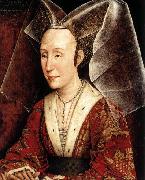Wholesale Oil Painting No Minimum |
|||||||||||
|
|
|||||||||||

|
|||||||||||
|
|
|
||||||||
WEYDEN, Rogier van derNetherlandish Northern Renaissance Painter, ca.1400-1464 major early Flemish master, known also as Roger de la Pasture. He is believed to have studied with Robert Campin. His early works also show the influence of Jan van Eyck. Van Eyck, however, had been a master at objective rendering of detail, whereas Roger in his work portrayed emotions with an assurance that has not been surpassed. His ability to depict piety is reflected in the early masterpiece Descent from the Cross (c.1435; Prado); he depicted with significant restraint the profound grief of the mourners grouped around the tragic figure of Jesus. His composition strongly affected later representations of the theme. Roger became City Painter in Brussels in 1436. He then produced a series of undated altarpieces including the Last Judgment (hospital, Beaune), the Braque Triptych (Louvre), Crucifixion with Donors (Vienna), and Adoration of the Magi (Berlin), which vary in execution from a stress on sumptuous details to a more sculptural rendering of the figures. Roger is believed to have made a pilgrimage to Italy in the holy year 1450. Whether this supposed excursion had any effect on his style is much debated. It has been shown that his Entombment (Uffizi) bears an affinity to the Tuscan treatment of the subject, particularly by Fra Angelico, and that Roger's Virgin and Child with Saints (Frankfurt) has a strong resemblance to the Italian religious art of the day. His style is, however, highly individual. His religious paintings and his portraits are characterized by a straightforward monumentality. The portraits, such as that of a young lady (National Gall. of Art, Washington, D.C.) and of Francesco d'Este (Metropolitan Mus.) exhibit a simple clarity of contour and psychological penetration. Other notable works are his St. Luke Painting the Virgin, of which a version or replica is in the Museum of Fine Arts, Boston, the Crucifixion |
||||||||
|
|
||||||||
Isabella of Portugal
Isabella of Portugal Painting ID:: 51989 |
c. 1500
Oil on panel,
47 x 38 cm c. 1500 Oil on panel, 47 x 38 cm |
|||||||
|
|
||||||||
|
Titian Italian High Renaissance Painter, ca.1485-1576 Italian painter active in Venice. As a young man he was taught by the Bellini family and worked closely with Giorgione. His early works are so similar in style to Giorgione's as to be indistinguishable, but soon after Giorgione's early death Titian established himself as the leading painter of the Republic of Venice. Among his most important religious paintings is the revolutionary and monumental Assumption (1516 ?C 18) for Santa Maria dei Frari, in which the Virgin ascends to heaven in a blaze of colour accompanied by a semicircle of angels. Titian was also interested in mythological themes, and his many depictions of Venus display his work's sheer beauty and inherent eroticism. Bacchus and Ariadne (1520 ?C 23), with its pagan abandon, is one of the greatest works of Renaissance art. Titian was sought after for his psychologically penetrating portraits, which include portrayals of leading Italian aristocrats, religious figures, and Emperor Charles V. He reached the height of his powers in The Rape of Europa (c. 1559 ?C 62), one of several paintings done for Philip II of Spain. He was recognized as supremely gifted in his lifetime, and his reputation has never declined. isabella of portugal wife of charles 1535 madrid, prado |
||||||||
|
|
||||||||
|
Prev Next
|
||||||||
|
|
||||||||
|
Related Paintings to Titian :. |
||||||||
|
|
||||||||
|
CONTACT US |

